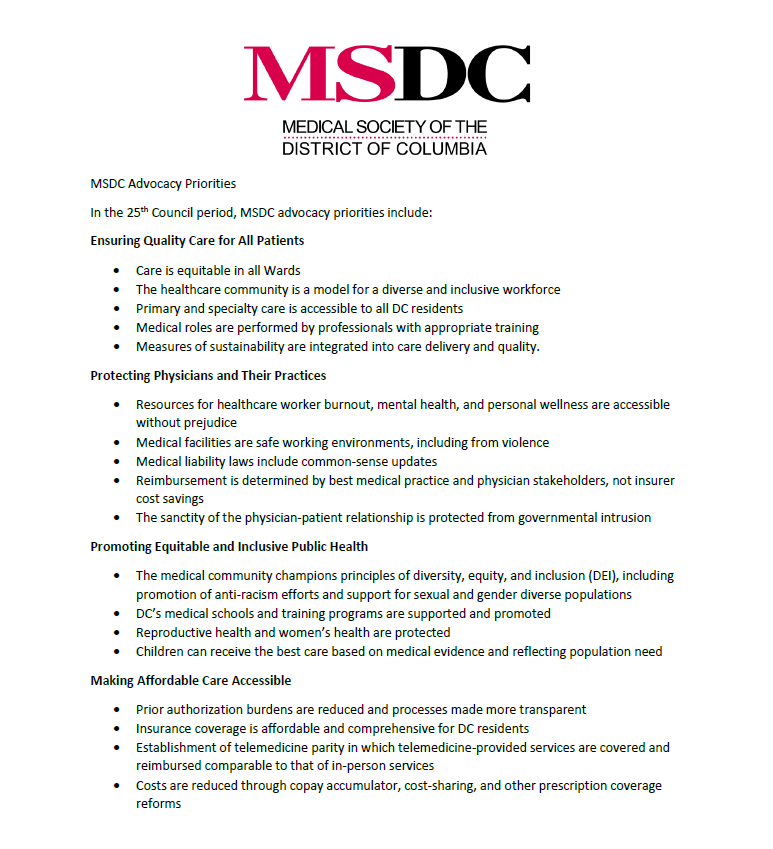Women's Health

MSDC has long advocated for women's health protections, the rights of women physicians, and affordable care for women's issues. MSDC works closes with ACOG, AAFP, AAP, and other specialty organizations to craft local legislation that allows DC to be the best place to practice women's and maternal medicine.
In the face of a maternal mortality crisis in the District, engagement in these issues is more important than ever. Learn more about how MSDC is working to protect the health of women, mothers, and babies in all wards in the city.
MSDC Statements and Testimony on Women's Health Issues
25th Council information coming soon!
MSDC Announces 25th Council Period Advocacy Agenda
With the current Council of DC legislative period approaching its end, MSDC is pleased to announce its advocacy agenda for the next two years.
At its December 5 Board of Directors meeting, the Board unanimously approved its advocacy priorities for 2023-2024. The agenda is modeled after the one the Board approved two years ago and establishes the Society's advocacy priorities during the next Council period. The agenda was updated and reviewed by MSDC's Advocacy Committee prior to the Board meeting.
As seen below, the agenda focuses on four areas that help make the District "the best place to practice medicine":
- Ensuring Quality Care for All Patients
- Protecting Physicians and Their Practices
- Promoting Equitable and Inclusive Public Health
- Making Affordable Care Accessible
Most of the priorities remain similar from the 2021-2022 document, as this one seeks to build off of a series of major advocacy wins this Council period. A summary of this session's advocacy successes will be published in the near future.
Making the list this year are a few new or
adjusted priorities. Nationwide challenges to the expertise of
physicians led to clearer calls for advocacy in areas like children's
healthcare, reproductive health, and health facility safety. The
document also includes for the first time advocacy for "measures of
sustainability" to reflect concerns about environment change and
medicine. Telemedicine is also explicitly spelled out as the pending end
of the federal public health emergency and insurer practice changes
endanger the effectiveness of this important medical tool.
MSDC
also looks to build on its unprecedented grassroots and testifying
record this Council period. MSDC members and physicians who want to become more involved in local advocacy can contact Robert Hay at hay [at] msdc.org.

Sample of Legislation MSDC Followed in Women's Health and Maternal Health
(See the whole list of bills here)
What does the bill do? Extends postpartum inpatient and outpatient benefits to at least one year after childbirth
MSDC position: We support this legislation and the extension of insurance benefits to mothers and babies to help maternal health in the District
Current status: SUCCESS. The bill passed the Council and was signed into law by the Mayor on August 14, 2020.
What does the bill do? The bill prohibits the District government from interfering with patients' reproductive health decisions and prohibits employers from punishing physicians who perform abortions or sterilizations outside of their employment.
MSDC position: We support this legislation as it allows physicians freedom of practice.
Current status: SUCCESS. The bill passed the Committee on Government Operations in January. MSDC submitted testimony at the December hearing, and MSDC member Sara Imershein testified at the hearing. The Council passed the bill and the Mayor signed it into law on March 23, 2020.
What does the bill do? The bill extends coverage for maternal health issues and fertility preservation, creates a Maternal Health Center in the District, and mandates two hours of cultural competence CME for health care providers.
MSDC position: We oppose the bill without changes due to inclusion of mandatory CME and some of the definitions in the bill being medically questionable.
Current status: The bill had a hearing in the Committee on Health in December, with MSDC member Dr. Sara Imershein testifying for MSDC and ACOG.
